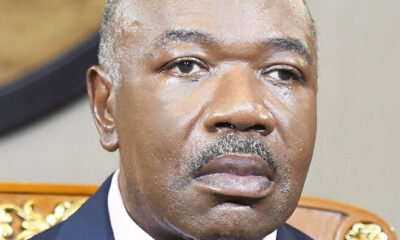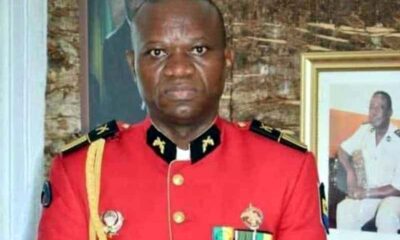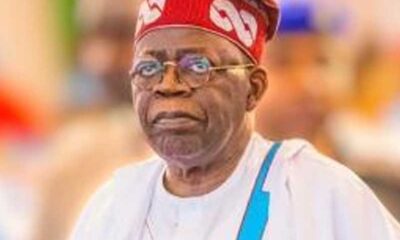Africa
Gabon coup leaders name Gen Brice Oligui Nguema as new leader
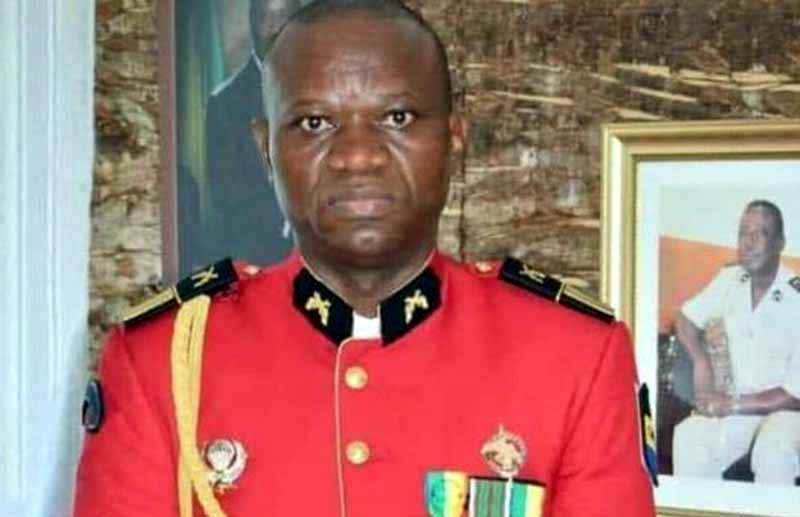
Gabon coup leaders name Gen Brice Oligui Nguema as new leader
Army officers who seized power in a coup in Gabon on Wednesday have named General Brice Oligui Nguema as the country’s transitional leader.
Gen Nguema was earlier carried triumphally through the streets of the capital Libreville by his troops.
The deposed President, Ali Bongo, has appeared in a video at his home, calling on his “friends all over the world” to “make noise” on his behalf.
The former French colony is one of Africa’s major oil producers.
Mr Bongo’s overthrow ended his family’s 55-year hold on power in the Central African state.
Army officers appeared on TV in the early hours of Wednesday to say they had taken power.
They said they had annulled the results of Saturday’s election in which Mr Bongo was declared the winner but which the opposition said was fraudulent.
The officers also said they had arrested one of Mr Bongo’s sons for treason.
READ ALSO:
Within hours, generals met to discuss who would lead the transition and agreed by a unanimous vote to appoint Gen Nguema, former head of the presidential guard.
Gen Nguema told France’s Le Monde newspaper that Gabonese people had had enough of Ali Bongo’s rule, and that he should not have run for a third term.
“Everyone talks about this but no one takes responsibility,” he said. “So the army decided to turn the page.”
Crowds in Libreville and elsewhere celebrated the army’s declaration.
But the coup was condemned by the UN, the African Union and France, which had close ties to the Bongo family.
The US state department urged Gabon’s military to “preserve civilian rule” and urged “those responsible to release and ensure the safety of members of government”. The UK condemned the “unconstitutional military takeover” of power.
There has long been simmering resentment of the Bongo family – it ruled Gabon for almost 56 years – and there has been public discontent over broader issues such as the cost of living.
“At first I was scared, but then I felt joy,” a resident of Libreville, who requested anonymity, told the BBC. “I was scared because of the realisation that I am living through a coup, but the joy is because we’ve been waiting for so long for this regime to be overthrown.”
Gabon coup leaders name Gen Brice Oligui Nguema as new leader
Africa
Nigeria denies alleged plot to destabilise Niger Republic

Nigeria denies alleged plot to destabilise Niger Republic
The Federal Government of Nigeria has refuted “in very strong terms” allegations that it is plotting to destabilise neighbouring Niger Republic.
The Nigerien authorities alleged that the Lakurawa terrorist group, with the help of foreign security forces, including Nigerian security forces, were responsible for the attack on the Niger-Benin oil pipeline on December 13, 2024, in Gaya, Dosso Region of Niger Republic.
However, Nigeria, the Ministry of Foreign Affairs, in a statement on Saturday signed by its acting spokesperson, Kimiebi Imomotimi Ebienfa, refuted the allegation.
“The Government of Nigeria condoles with the Government of Niger over the unfortunate attack on the oil pipeline, but informs that the perpetrators were neither backed nor assisted by Nigerian authorities.
READ ALSO:
- Navy arrests 19 Nigerians attempting to reach Europe by hiding on ship
- Troops arrest four Ambazonian rebels in Taraba
- NIMC warns against extortion, reaffirms free NIN enrollment
“The Government of Nigeria is strongly committed to the fight against terrorism and will not condone or support the activities of such groups.
“The Federal Government of Nigeria also expresses very serious concern and states categorically that there are no French military troops in the northern part of the country preparing to destabilize the Government of Niger.
“These allegations are unfounded and should be discarded in their entirety,” the Statement read in part.
It also noted that the relationship between Nigeria and France had always been cordial, saying it is guided by mutual respect, dignity, and non-interference in each other’s internal affairs.
The government of Nigeria assured that it would continue to explore all peaceful means to maintain its cordial relationship with the Republic of Niger for the benefit of the people of both countries.
Nigeria denies alleged plot to destabilise Niger Republic
Africa
Suspected witchdoctors arrested over attempt to ‘bewitch’ Zambia’s President

Suspected witchdoctors arrested over attempt to ‘bewitch’ Zambia’s President
Two men were detained in Zambia on charges of being “witchdoctors” tasked with attempting to bewitch the president.
The police stated they had arrested Jasten Mabulesse Candunde and Leonard Phiri in Lusaka.
“Their purported mission was to use charms to harm” President Hakainde Hichilema, according to the police statement issued on Friday.
Many individuals in the southern African country believe in and dread witches.
The police stated Mr. Candunde and Mr. Phiri were hired by Nelson Banda, MP Emmanuel “Jay Jay” Banda’s younger brother.
The MP was reportedly arrested last month in nearby Zimbabwe on robbery allegations, which he denies, but he has not been seen in public since.
He is also accused of escaping from detention in August while waiting to appear in court.
The opposition Patriotic Front (PF), led by z, has previously claimed that the charges are politically motivated.
READ ALSO:
- Farotimi: Advocacy group wants UK college to break ties with Afe Babalola
- Yahaya Bello walks home after release from Kuje prison Friday evening
- Fire kills family of three in Ibadan
Emmanuel Banda, who has been an independent MP since 2021, previously worked with Lungu, who lost the presidency to Hichilema that same year.
The police stated the MP’s younger brother, Nelson, was “currently on the run” in their statement.
Mr. Candunde and Mr. Phiri face charges under Zambia’s Witchcraft Act for “possession of charms,” “professing knowledge of witchcraft,” and “cruelty to wild animals.”
The pair was found with “assorted charms,” including a live chameleon, according to the authorities.
According to the police statement, they claimed they had been given more than 2 million Zambian kwacha (£58,000; $73,000) for their “mission.”
The accused are in jail and will appear in court “soon,” according to the police, although no specific date has been set for the hearing. They have not yet responded in public to the charges.
Suspected witchdoctors arrested over attempt to ‘bewitch’ Zambia’s President
Africa
South African man sentenced to six life terms for killing his relatives
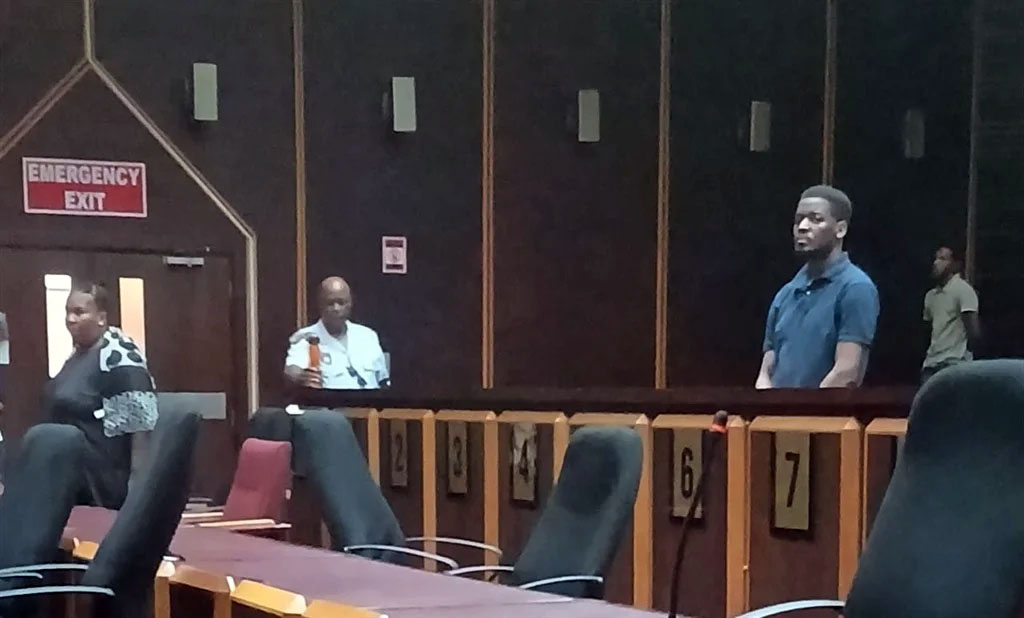
South African man sentenced to six life terms for killing his relatives
-

 Railway1 day ago
Railway1 day agoLagos Rail Mass Transit part of FG free train ride – NRC
-

 metro10 hours ago
metro10 hours agoWhy we displayed ‘Jesus Christ is not God’ banner at Lekki mosque -Imam
-

 metro2 days ago
metro2 days agoCourt stops customs from seizing imported rice in open market
-

 metro3 days ago
metro3 days agoIbadan stampede: Tinubu orders probe as death toll hits 40
-

 metro2 days ago
metro2 days agoIbadan stampede: Ooni reacts after arrest of ex-wife
-

 metro1 day ago
metro1 day agoNIMC warns against extortion, reaffirms free NIN enrollment
-

 metro2 days ago
metro2 days agoAfe Babalola: Court grants Dele Farotimi bail, barred from media interviews
-

 News3 days ago
News3 days agoAdebayo Ogunlesi, 2 other Nigerians make Forbes 50 wealthiest Black Americans list 2024

